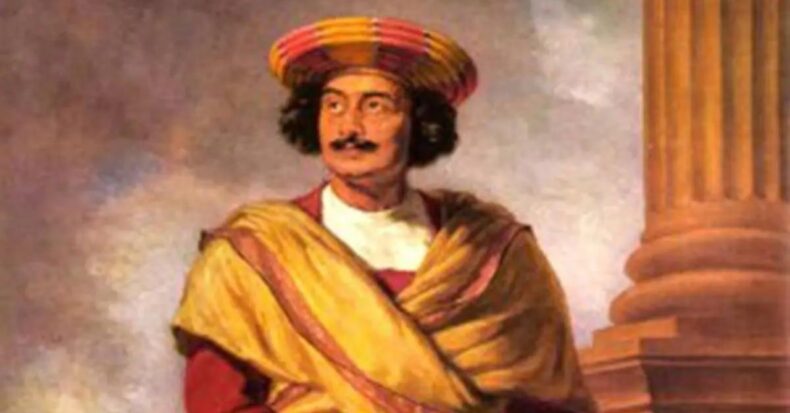“The Superstitious Practices Which Deform the Hindu Religion Have Nothing to Do With the Pure Spirit of Its Dictates.” – Raja Ram Mohan Roy .
The Father of Modern India’s Renaissance, Ram Mohan Roy, was awarded the title of “Raja” by the Mughal Emperor Akbar II. He was a tireless social reformer and India’s first liberal modernist.
The arrival of the British in India brought forth modern western thought and ideologies. Ram Mohan Roy was so ahead of his time that he understood the stagnation and corruption of contemporary Indian society and found the adoption of modern western ideologies essential for its regeneration.
He was moved so deeply by the love of his country that he worked all his life tirelessly to abolish the inhumane practices of untouchability and sati.
Even in the 1800s, he was aware of women’s rights and worked for their upliftment despite being banished from his own village because he opposed the practice of “Sati”.
He fought for the rights of women to inherit family property in an era when women were considered a mere shadow of men. He even rejected the existence of polygamy.
A Luminous Star in the Firmament of Indian History:
Rabindranath Tagore, the writer of the sacred words, “Jana Gana Mana”, designated Roy as the inaugurator of the modern age in India and called him a luminous star in the firmament of Indian History.
Roy supported the philosophy of action in the service of the motherland. He and other modern thinkers called out the people of India to be obsessed with the past glories of India and called them for action to stand against injustice and corruption.
Instead of wholly rejecting the foreign wind, he tried to inculcate the ideas of western political thinkers with the values of Indian society. He condemned the presence of hypocritic Indian values such as untouchability, sati and social inequality.
He believed that these religious orthodoxies had become the cause of the detriment of Indian society, thus favouring religious reforms.
He concluded that only religious reforms would lead to social reforms and political modernization. Roy disregarded all the rituals and sacrifices and instead promoted self-purification.
A Boon in Disguise:
Ram Mohan Roy was deeply moved by the French Revolution’s ideals, i.e. liberty, equality, and fraternity.
He was a political thinker par excellence, and he believed that the adoption of British liberalist ideologies would ultimately lead to the establishment of democratic institutions in India.
Though he misjudged the intention of Britishers to revolutionize India, eventually, the British rule indeed rose up the sleeping patriots of India. It formed a bond of unity and love for their motherland.
The fact which need not be misunderstood is that he despised colonialists. Still, he realized the need for British rule to inject the values it represented in Britain and because the former was culturally superior to the feudal regime.
Thus, he recognized the British rule as a “Boon in Disguise”. Although, he soon realizes the potential of the British rule to become autocratic in nature. Thus, along with his colleague Dwarka Nath Tagore, he fought for the right of freedom of the press.
The height of his intellect could easily be articulated from this step as even in the 19th century.
He identified the need for independent media to address the grievances of the people and also as means of safety valve to prevent the autocracy of the colonial rulers. Therefore, he was a pioneer of Indian Journalism.
Monotheism:
Born in a country of multiple Gods and Goddesses, Ram Mohan Roy had the vision to advocate the idea of “One God”. He promoted the belief of Islamic Monotheism and said, “There is only one God. None Equals him, he has no end. He is present in all living beings.”
He ultimately relied on the power of human reason to question any orthodox belief before admitting it blindly.
In his view, human reason was the final touchstone of the truth of any doctrine, whether eastern or western. He wanted India to learn from the west but never intended the imposition of the culture of the west on India.
He desired to learn to be an intellectual and creative process through which Indian culture and thought should be renovated. He favoured Internationalism and advocated free cooperation between nations, and even founded the Hindu college (1817) with the help of David Hare.
Fearless as a Lion:
Though, Roy paid heavily for his liberal thoughts. He was boycotted socially by many groups, and even his mother joined them. He was branded as a heretic and an outcast. But, he was indeed Fearless as a Lion.
They may have ignored him, but the world never dared to turn a blind eye to Roy. He single-handedly framed the minds of millions of Indian people, especially the youth.
He led us toward an India which condemned “hero-worship” and used human reason as the best judge of policies and events.












